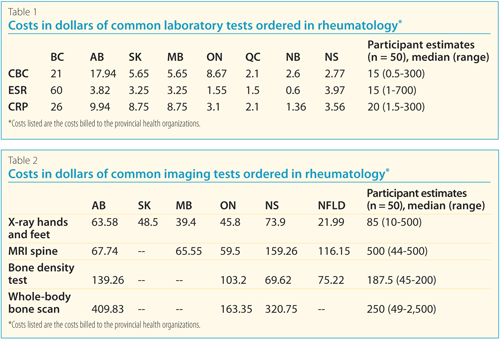Fall 2016 (Volume 26, Number 3)
The Costs of Care
By Victoria YY Xu, BHSc, MD; and
Dr. Shirley Chow, MD, FRCPC, MSc (QIPS)
Download PDF

In 2013, 350 HLA-B27 tests were ordered in Alberta.1
In Ontario, approximately 21,000 were done.2 The population of Ontario is three times that of Alberta; with relatively similar incidence of inflammatory back disease, one cannot account for the difference in number of tests that are ordered. The difference is that, in Alberta, only rheumatologists can order the test.
More and more, there has been increasing acknowledgement of rising costs and inefficiencies within our healthcare system. In response to this, the CRA joined the Choosing Wisely Canada© campaign, with the goal to identify and promote care that is evidence-based, not duplicative, free of harm, and truly necessary.3 The campaign helps physicians and patients engage in conversations about when a test, treatment, or procedure may be wasteful, harmful, and/or unnecessary.
Physicians have a key role to play in providing high-value care, meaning the highest quality care at the lowest costs. Most physicians are unfamiliar with costs of care and information about costs can be difficult to find. In educating the future generation of physicians, the CanMEDS 2015 learning milestones emphasizes the importance of engaging in the stewardship of healthcare resources. However, cost-conscious care is not featured within most medical curricula.
At the 2016 CRA Annual Scientific Meeting (ASM) in Lake Louise, all attendees were invited to estimate the costs of common lab and imaging tests ordered in rheumatology. These costs across Canada, along with participants’ estimates, are shown in Table 1 and Table 2. Given the considerable discrepancies among estimated and actual costs, this topic is certainly an area of education for trainees and health care practitioners. Greater knowledge and transparency of costs are important for healthcare practitioners and trainees alike to gain competence in resource stewardship and provide high-value care to patients.

Beyond financial costs, misuse or overuse of healthcare resources incurs other harms, such as direct costs, opportunity costs, and downstream costs. Direct costs to patients include time, anxiety, out-of-pocket expenses, and clinical harm (e.g., radiation, drug side effects, and infections). Direct costs to the healthcare system include time, resources, and overburdened emergency departments. Opportunity costs include time the patient must spend away from work and other responsibilities, time and resources healthcare staff must direct away from other patients in greater need, and system delays due to unnecessary or overused resources. On a larger scale, wasteful healthcare spending affects other sectors within the provincial budget, such as education. Finally, downstream costs for patients who receive unnecessary testing include follow-up appointments, further procedures, long-term side effects, nosocomial infections, and antimicrobial resistance.
Ultimately, the campaign hopes to encourage practitioners that in medicine, more care is not always better.
The CRA would like to thank Dr. Jason Kur, Dr. Robert Ferrari, Dr. Jodie Reis, Dr. Cory Baillie, Dr. Michel Zummer, Dr. Sylvie Ouellette, Dr. Trudy Taylor, and Dr. Majed Khraishi for helping find the costs of tests. The Choosing Wisely Committee would also like to congratulate Dr. Linda Brown, the CRA AGM attendee who guessed the closest to the actual costs, winning attendance to the next CRA ASM. Unfortunately, some provinces’ costs were not available. If you would like to contribute the costs of tests in your province, please contact claire@rheum.ca.
References:
1. Alberta figures based on unpublished provincial laboratory data, 2013.
2. Ontario figures based on Ontario Health Insurance Plan (OHIP) codes for HLA-B27 . Data provided by the Institute for Clinical Evaluative Sciences (ICES), March 9 2015.
3. CRA Choosing Wisely Recommendations. Available at: www.rheum.ca/en/the_cra/choosing_wisely_canada1.
Victoria YY Xu, BHSc, MD
Resident, Department of Medicine,
University of Toronto,
Toronto, Ontario
Shirley Chow, MD, FRCPC, MSc (QIPS)
Assistant Professor,
Division of Rheumatology,
University of Toronto,
Toronto, Ontario |

